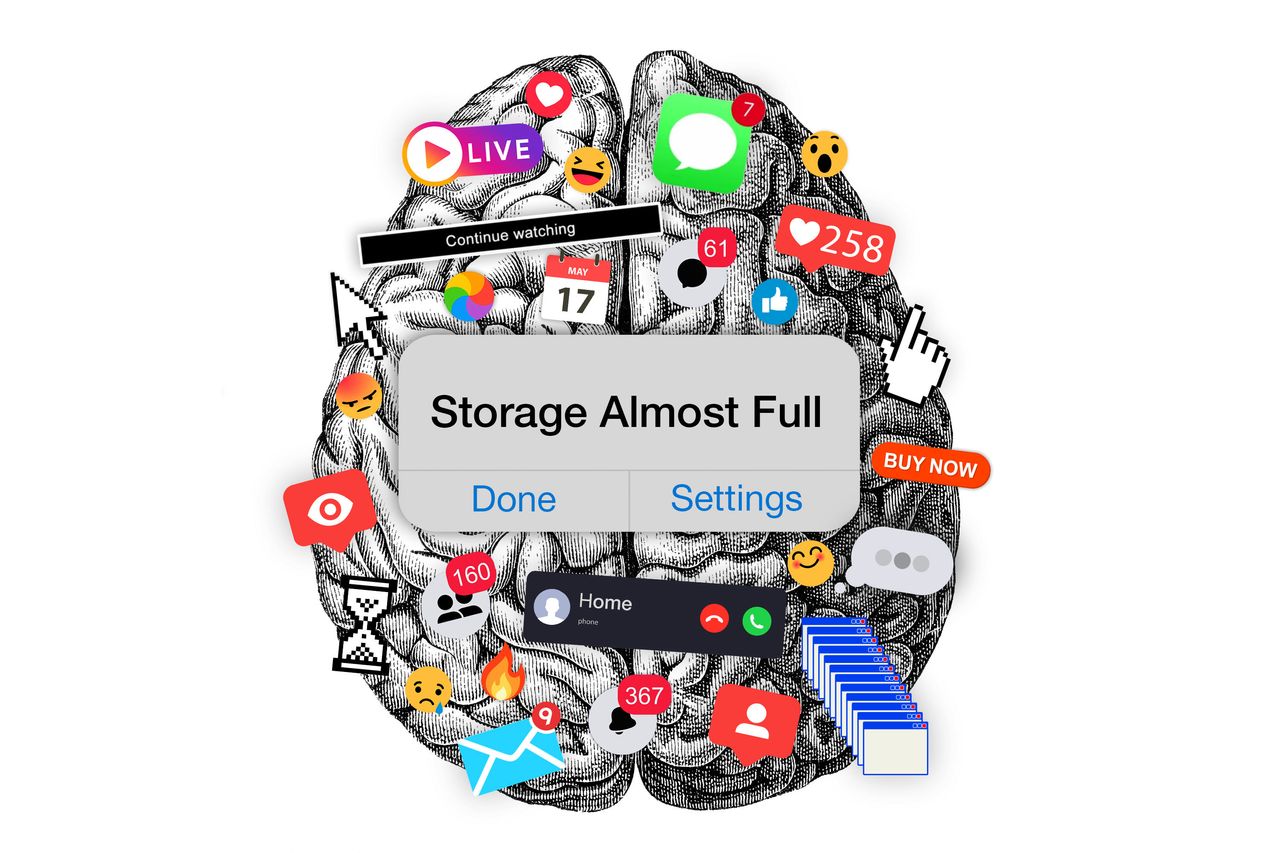How To Overcome Multitasking Madness
oggling between devices and apps is leading to shortened attention spans, errors and memory problems. There are remedies.
You know that productivity rush you get when responding to Slack messages from colleagues, emailing your child’s teacher and placing an Amazon order—all while on a Zoom?
Not all multitasking is the same, of course: Folding laundry while watching TV isn’t a problem. Studying for an exam while listening to music and checking your social-media feed is.
As it turns out, media multitasking is making us less productive, not more, according to neuroscientists and others who are studying this. You might be checking stuff off your to-do list, but you might also be missing some of the more important things that go whizzing by.
Nonstop toggling between devices and apps slows our ability to process and retain information, decreases our ability to filter out extraneous information, shortens our attention span and causes us to make mistakes, neuroscientists say. The researchers say the glut of new technological distractions over the past decade means the consequences of bad multitasking are now more dire.
Fortunately, there are remedies for multitasking madness.
Walking and chewing gum
Attempting to do too many things at once causes a bottleneck in the prefrontal cortex, the brain’s control centre, according to brain researchers at the University of Helsinki. They conducted brain-imaging scans of young adults to see what was going on while the participants were asked to read or listen to two kinds of sentences: sensical (“This morning I ate a bowl of cereal.”) and nonsensical (“This morning I ate a bowl of shoes.”).
The participants were asked to identify which sentences made sense. They were also presented with written and spoken sentences at the same time. The participants’ ability to correctly identify sentences declined significantly when their attention was divided between the written and spoken sentences.
That original study was published in 2015 in the journal Frontiers in Human Neuroscience, and a follow-up published this month covered other ground and reaffirmed the initial findings.
Carl Marci, a psychiatrist at Massachusetts General Hospital in Boston who has researched media multitasking extensively, said the study, in which he had no involvement, provides evidence that the brain reaches a capacity limit as it tries to process two streams of information at once.
Dr. Marci first began studying media multitasking when he worked at market-research firm Nielsen as chief neuroscientist of its consumer-neuroscience division. In 2002,he saw American adults were spending up to 40 hours a week consuming media; now, they’re spending about 80 hours a week doing so.
“How do people spend the equivalent of two full-time jobs a week consuming media? It isn’t possible unless they’re doing two things at once,” said Dr. Marci, who dedicated a section of his new book, “Rewired: Protecting Your Brain in the Digital Age,” to the phenomenon.
Those at greatest risk are children, he said, who are spending more time on devices at ever-younger ages, which has the potential for disaster come the teenage years.
“The analogy often used when describing teens, that there’s too much gas and not enough brake, applies here,” Dr. Marci said.
Translation: There’s more available stimulation to the brain’s reward and emotion centres, but not enough friction that comes from good judgment. You get that from your prefrontal cortex, which isn’t developed until around age 25, he added.
Trouble at school and work
Numerous studies have found that learning suffers among young children even when TV is on in the background, and that grades decline when students are texting or using social media in class or when doing homework.
Adults aren’t immune to the detrimental effects of trying to do too much. We’re constantly distracted by notifications at work and families can’t seem to watch a TV show together without one or more members simultaneously scrolling social media.
These habits tend to carry over into all areas of life, Dr. Marci said, including driving, where divided attention can be fatal.
But are kids adapting to this world of multiple data streams? Will they become tomorrow’s mega-multitaskers? The answer appears to be no.
The Finnish researchers conducted another multitasking study on the recognition of nonsensical sentences. Performed a year later, this larger second study involved adolescents and young adults, who shared their daily media-multitasking habits. Those who reported the highest levels of media multitasking performed worse on the sentence-recognition tasks when they were distracted by music.
These heavy multitaskers showed higher prefrontal-cortex activity than mono-taskers. That doesn’t mean they were achieving more. They were exerting more brain effort to recognize the sentences in the presence of distraction.
“We feel we’re working harder,” Dr. Marci said. “But it doesn’t mean we’re working smarter.”
The upside? Those in the study who claimed to multitask less often were better able to tune out the distraction.
What you can do
Here are tips to help you stay on task and be less scattered.
Block out focus time. Set aside time to get a work or school project done and set your phone to Do Not Disturb. Close out of your email and other distracting programs on your computer and turn off notifications. Setting an alarm can help so you’re not watching the clock.
Set expectations. If your boss or co-workers frequently need to be in touch, let them know when you plan to be offline focusing on a project. Mark it on your calendar if you need to.
Leave your phone in another room. Whether you’re watching a movie with your family or doing homework, have your phone out of sight. Research has shown that just seeing your phone, even if it’s muted and the screen is obscured, can lead to distracting thoughts.
Teach good habits early. All of this applies to your kids, who will not only follow your lead, but will also seek any and all available distractions on their own. It’s good to set an example, as well as limit what they can and can’t do during, for instance, the homework hour.
Reprinted by permission of The Wall Street Journal, Copyright 2021 Dow Jones & Company. Inc. All Rights Reserved Worldwide. Original date of publication: May 4, 2022
 Copyright 2020, Dow Jones & Company, Inc. All Rights Reserved Worldwide. LEARN MORE
Copyright 2020, Dow Jones & Company, Inc. All Rights Reserved Worldwide. LEARN MORE
This stylish family home combines a classic palette and finishes with a flexible floorplan
Just 55 minutes from Sydney, make this your creative getaway located in the majestic Hawkesbury region.
As Paris makes its final preparations for the Olympic games, its residents are busy with their own—packing their suitcases, confirming their reservations, and getting out of town.
Worried about the hordes of crowds and overall chaos the Olympics could bring, Parisians are fleeing the city in droves and inundating resort cities around the country. Hotels and holiday rentals in some of France’s most popular vacation destinations—from the French Riviera in the south to the beaches of Normandy in the north—say they are expecting massive crowds this year in advance of the Olympics. The games will run from July 26-Aug. 1.
“It’s already a major holiday season for us, and beyond that, we have the Olympics,” says Stéphane Personeni, general manager of the Lily of the Valley hotel in Saint Tropez. “People began booking early this year.”
Personeni’s hotel typically has no issues filling its rooms each summer—by May of each year, the luxury hotel typically finds itself completely booked out for the months of July and August. But this year, the 53-room hotel began filling up for summer reservations in February.
“We told our regular guests that everything—hotels, apartments, villas—are going to be hard to find this summer,” Personeni says. His neighbours around Saint Tropez say they’re similarly booked up.
As of March, the online marketplace Gens de Confiance (“Trusted People”), saw a 50% increase in reservations from Parisians seeking vacation rentals outside the capital during the Olympics.
Already, August is a popular vacation time for the French. With a minimum of five weeks of vacation mandated by law, many decide to take the entire month off, renting out villas in beachside destinations for longer periods.
But beyond the typical August travel, the Olympics are having a real impact, says Bertille Marchal, a spokesperson for Gens de Confiance.
“We’ve seen nearly three times more reservations for the dates of the Olympics than the following two weeks,” Marchal says. “The increase is definitely linked to the Olympic Games.”

Getty Images
According to the site, the most sought-out vacation destinations are Morbihan and Loire-Atlantique, a seaside region in the northwest; le Var, a coastal area within the southeast of France along the Côte d’Azur; and the island of Corsica in the Mediterranean.
Meanwhile, the Olympics haven’t necessarily been a boon to foreign tourism in the country. Many tourists who might have otherwise come to France are avoiding it this year in favour of other European capitals. In Paris, demand for stays at high-end hotels has collapsed, with bookings down 50% in July compared to last year, according to UMIH Prestige, which represents hotels charging at least €800 ($865) a night for rooms.
Earlier this year, high-end restaurants and concierges said the Olympics might even be an opportunity to score a hard-get-seat at the city’s fine dining.
In the Occitanie region in southwest France, the overall number of reservations this summer hasn’t changed much from last year, says Vincent Gare, president of the regional tourism committee there.
“But looking further at the numbers, we do see an increase in the clientele coming from the Paris region,” Gare told Le Figaro, noting that the increase in reservations has fallen directly on the dates of the Olympic games.
Michel Barré, a retiree living in Paris’s Le Marais neighbourhood, is one of those opting for the beach rather than the opening ceremony. In January, he booked a stay in Normandy for two weeks.
“Even though it’s a major European capital, Paris is still a small city—it’s a massive effort to host all of these events,” Barré says. “The Olympics are going to be a mess.”
More than anything, he just wants some calm after an event-filled summer in Paris, which just before the Olympics experienced the drama of a snap election called by Macron.
“It’s been a hectic summer here,” he says.

AFP via Getty Images
Parisians—Barré included—feel that the city, by over-catering to its tourists, is driving out many residents.
Parts of the Seine—usually one of the most popular summertime hangout spots —have been closed off for weeks as the city installs bleachers and Olympics signage. In certain neighbourhoods, residents will need to scan a QR code with police to access their own apartments. And from the Olympics to Sept. 8, Paris is nearly doubling the price of transit tickets from €2.15 to €4 per ride.
The city’s clear willingness to capitalise on its tourists has motivated some residents to do the same. In March, the number of active Airbnb listings in Paris reached an all-time high as hosts rushed to list their apartments. Listings grew 40% from the same time last year, according to the company.
With their regular clients taking off, Parisian restaurants and merchants are complaining that business is down.
“Are there any Parisians left in Paris?” Alaine Fontaine, president of the restaurant industry association, told the radio station Franceinfo on Sunday. “For the last three weeks, there haven’t been any here.”
Still, for all the talk of those leaving, there are plenty who have decided to stick around.
Jay Swanson, an American expat and YouTuber, can’t imagine leaving during the Olympics—he secured his tickets to see ping pong and volleyball last year. He’s also less concerned about the crowds and road closures than others, having just put together a series of videos explaining how to navigate Paris during the games.
“It’s been 100 years since the Games came to Paris; when else will we get a chance to host the world like this?” Swanson says. “So many Parisians are leaving and tourism is down, so not only will it be quiet but the only people left will be here for a party.”
This stylish family home combines a classic palette and finishes with a flexible floorplan
Just 55 minutes from Sydney, make this your creative getaway located in the majestic Hawkesbury region.






















